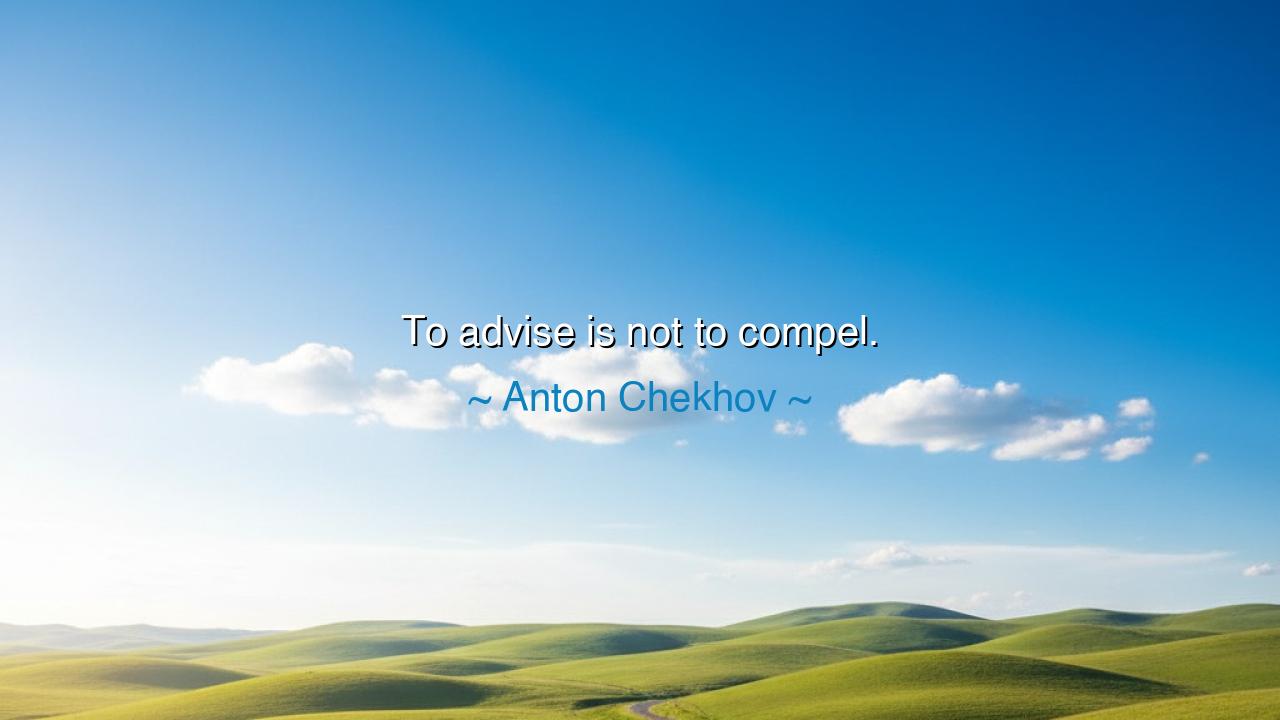
To advise is not to compel.






O Seekers of Truth and Guidance, hear the words of Anton Chekhov, a master of understanding human nature: "To advise is not to compel." In this simple yet profound saying, Chekhov unveils the true essence of wisdom and leadership. Advice is a gift, an offering of insight, a hand extended in kindness to guide another along their path. Yet, it is not to force or dominate, but to respect the autonomy of the one who seeks counsel. To advise is to offer possibilities, to shed light on the journey, but never to impose a particular destination upon another’s soul.
Consider, O Children, that wisdom comes not through domination but through understanding. A true advisor does not command the will of others, but shows them the way and allows them to walk it with their own feet. This is the humility of true wisdom—that it seeks not to control, but to empower. To offer advice is to trust in the capacity of others to make their own choices, to honor their freedom, and to guide them without the weight of coercion.
Look to the example of Socrates, whose method of teaching was grounded in the art of questioning, not in the dictation of answers. He did not seek to impose his own beliefs upon his students; rather, he sought to help them find the truth within themselves. Through his method of questioning, known as the Socratic method, he allowed others to arrive at their own conclusions, understanding that genuine wisdom comes from within. He advised, but never compelled, leaving the final decision in the hands of those he taught. His guidance was a torch lighting the way, but it was up to the individual to walk the path.
And so, O Seekers, let us understand that true guidance is not a force but a gift. To advise is to offer wisdom, not as a ruler over another, but as a companion who walks beside them, offering light without the demand to follow. We must remember that every soul is a unique journey, and to force our way upon another is to rob them of their own path. Advice is powerful not because it compels, but because it respects the autonomy and dignity of the individual.
Let us, therefore, approach others with this wisdom: to advise is to offer the richness of our experience and understanding, but to do so with respect and humility. We guide, but we do not control; we offer direction, but we do not demand the journey. In this, we unlock the true power of wisdom: the ability to inspire, not through force, but through freedom and understanding. Let us be those who offer advice as a gentle wind, not a commanding storm, and in this way, we empower others to walk their own path with strength and grace.






HYVo Thi Hai Yen
This quote is a reminder that advice should come from a place of respect, not from a desire to control. I wonder, though, in situations where someone’s well-being is at risk, is it ever appropriate to push a little harder with advice? Can there be times when what’s meant to be merely advice starts feeling like a compulsion for the person receiving it? It’s an interesting balance between offering guidance and respecting autonomy.
HNLinh Hoang Nguyen
Chekhov’s quote makes me think about the fine line between offering advice and exerting control. It’s true that offering advice should be about empowering someone to make their own choices. But what happens when someone is genuinely looking for help and doesn’t take the advice? Can you still advise without trying to influence the decision? How do we ensure that our desire to help doesn’t unintentionally become a form of coercion or pressure?
ADNguyen Pham Anh Dong
I love how this quote emphasizes the importance of free will in decision-making. To advise without compelling seems like a respectful way of engaging with others. However, how do you navigate situations where you strongly believe your advice could prevent someone from making a mistake? How do you ensure that your guidance is offered without unintentionally imposing your will or making the other person feel obligated to follow it?
MPTri Man Phac
This quote really resonates with me. It highlights the difference between offering guidance and forcing someone to follow a specific path. Advice should be a suggestion, not a mandate. But, when is advice genuinely received, and when does it feel more like pressure? Is it possible to give advice without anyone feeling compelled to follow it? I guess it depends on the person’s willingness to listen and take responsibility for their own decisions.